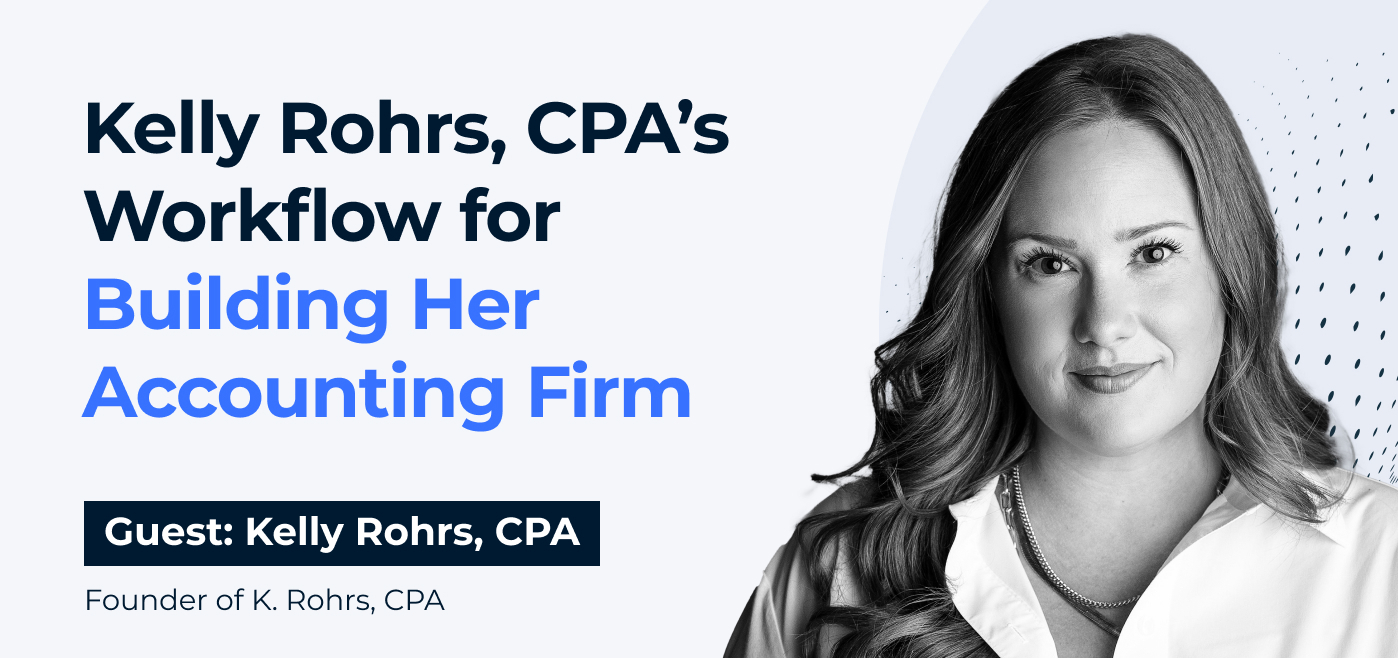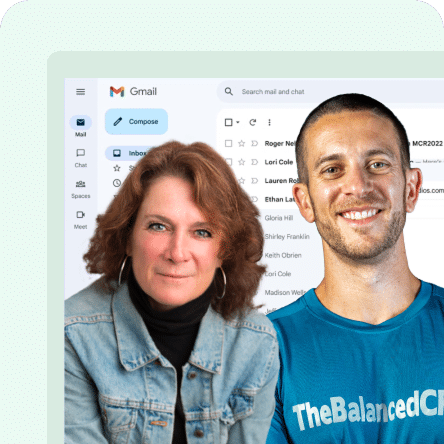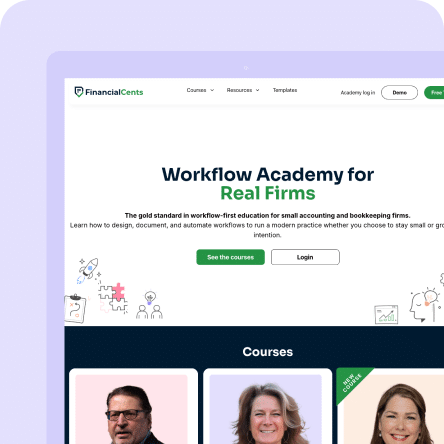Workflow Diaries is a series that explores the workflow processes firm owners have implemented to systematize their processes, improve productivity, and scale their firms. It is culled from our podcast, The Accounting Flow.
‘I started this business with a child under one, and now I have two. The growth in the first three years was unbelievable,’ says Kelly Rohrs, CPA, reflecting on the challenges and rewards of building her accounting firm from the ground up.
Kelly Rohrs didn’t follow the traditional path to accounting. Her journey started with a love for numbers, a brief detour in actuarial science, and a leap into accounting without any real experience. After working her way up in a firm for 10 years, she decided it was time to go solo and build her practice—while balancing motherhood and business ownership.
I decided to pivot and go back to school for accounting. I stayed with that firm for 10 years. The firm changed names multiple times, as small firms often do with different ownership structures."
Kelly RohrsIf you’re in a similar position and wondering how to build your accounting firm from scratch, Kelly’s experience offers a wealth of actionable insights. In a recent episode of the Accounting Flow Podcast, Kelly shares practical tips, advice, and her workflow for building her accounting firm.
Her story provides valuable lessons on finding that crucial balance and succeeding as a business owner.
Getting Started as a Solo CPA
So, you’re thinking about starting your accounting practice? It might feel overwhelming at first, but it’s achievable. Kelly Rohrs is a perfect example of how you can successfully build a practice from the ground up.
When she decided to build her accounting firm, she didn’t just jump in without a plan. She knew that laying a strong foundation was key to her success.
Establish a Foundation
Before Kelly officially launched her practice, she took important steps to set up the basics. First, she registered her business well in advance, getting the legal framework and paperwork in place. She also worked on her website and branding, ensuring her firm had a professional online presence right from the start.
This proactive approach meant that by the time she left her old firm, she was ready to hit the ground running. Instead of scrambling to figure things out, Kelly could immediately focus on growing her client base.
But it wasn’t just about the paperwork. Kelly also thought carefully about what kind of clients she wanted to serve. While her initial plan was to focus on the dental industry, she quickly realized that referrals from her network led her in a different direction. This organic growth led her to work with attorneys and other professional service providers, and she embraced this shift in focus.
This is important for solo accountants because it highlights the need to be flexible and responsive to opportunities as they arise. While it’s essential to have a clear vision and plan for your firm, especially when starting out, you may find that your initial niche or target market doesn’t end up being the best fit. Kelly’s experience shows that being open to where referrals and connections take you can lead to organic growth and potentially more rewarding client relationships.
Choose the Right Clients
One of Kelly’s biggest lessons was learning how important it is to choose the right clients from the start. In the early days, it was tempting to take on any client just to keep cash flowing, but Kelly knew that the quality of her clients would shape her firm’s future. A year into running her business, she made the tough decision to fire a major client because they weren’t the right fit. It was risky, but it freed her up to focus on clients who aligned with her values and vision.
For Kelly, the right clients weren’t just about revenue—they were about building long-term relationships with people who trusted her and respected her work. That’s the kind of foundation that can help your firm grow sustainably.
One of the biggest challenges was taking on the right clients. Early on, you need cash flow, so it’s tempting to take on clients even if they’re not a good fit."
Kelly RohrsDon’t just chase after any client who brings in revenue. Look for clients who match your values and vision. It’s these relationships that will help your firm grow in a meaningful and sustainable way.
Workflow Breakdown
When Kelly Rohrs decided to start her own accounting firm, she knew her workflow was important for keeping things running smoothly. Here’s what she did.
Tech Tools for Efficiency
To streamline her day-to-day work, Kelly initially relied on a mix of handwritten notes, Microsoft To Do, and some basic tools like QuickBooks Online for managing client finances and SmartVault for cloud storage. As a solo practitioner, it worked well enough in the beginning, but she quickly realized that relying on memory and scattered systems wasn’t sustainable as her practice grew.
As someone who views both life and business through the lens of efficiency, Kelly was always focused on making smart decisions that would benefit her firm in the long run.
I tend to view life through that lens—what’s going to be more efficient or better for the greater good, whether it’s for the company or my family."
Kelly RohrsRecognizing the need for more structure, Kelly integrated formal workflows, a tax program that she was already familiar with, and brought IT support to help her set it up remotely.
About a year into her solo practice, Kelly decided to hire her first full-time team member.
Although she wasn’t overwhelmed with work at that point, she anticipated more referrals and wanted to be prepared before things got too busy. Hiring the right person early on allowed her to delegate tasks more effectively and focus on growing her firm. Additionally, her mom helped with smaller tasks, which was a huge relief during the early stages.
Organizing Tasks
Kelly’s approach to organizing tasks is all about staying ahead of the game. While she started solo with a messy system of handwritten notes, she quickly realized that staying organized was crucial to maintaining efficiency—not just for her firm but also for her personal life.
As a solo practitioner or CPA, having the right tools can make all the difference. Thankfully, today’s options are far more efficient than handwritten notes.
Workflow management tools like Financial Cents provide a clear, organized dashboard where you can see all your tasks at a glance. This makes it easy to prioritize your workload, track progress, meet deadlines, and even assign tasks to team members as needed.
Growing the Accounting Firm Without Overwhelm
When it comes to building a successful accounting firm without getting overwhelmed, Kelly Rohrs, CPA, has a few key strategies that helped her manage the workload and grow her business efficiently.
Delegation and Outsourcing
One of Kelly’s key strategies for staying organized and growing her firm is knowing when to delegate tasks. This skill is really important for anyone running a solo practice because it helps her focus on the most important work that helps her firm grow.
For Kelly, delegating isn’t just about giving away tasks; it’s about using her resources wisely. For instance, when she needed to set up a new tax program, she realized that getting help from her support team would be the best way to do it. This allowed her to ensure everything was done correctly while she could concentrate on her clients and business strategy.
Kelly is also good at planning ahead. Before her workload got too heavy, she hired extra help. This decision not only reduced stress during busy times but also allowed her to keep providing excellent service to her clients.
Networking and Referrals
Kelly grew her accounting practice by leveraging her network, which she expanded through strategic personal branding on social media. She’s deeply engaged in professional associations and regularly attends industry events. But the real driver behind her growing client base? Referrals. Word-of-mouth referrals became a major source of new business, especially in niche markets like attorneys and professional services.
Her hard work paid off, earning her recognition as one of Long Island’s top 50 women in business and the title of 2022 Premier Businesswoman of Long Island. With a strong public profile and a client base largely built through networking, managing relationships became a major part of her success.
“Around 2017 or 2018, I started attending more conferences,” Kelly says. “At one in New York City, I realized social media was the way forward. Since my old firm didn’t have a social media budget or approval for promotions, I decided to promote myself instead.”
Rather than relying on hard sales pitches, Kelly focused on sharing her insights, experiences, and ideas. This genuine approach helped her grow from a one-person team into a team of 14.
Documenting with SOPs
As her firm grew, Kelly knew she needed clear processes in place to maintain consistency and minimize errors.
This approach is vital because it allows her team to work efficiently and significantly reduces the chances of mistakes.
When you have everything laid out in writing, it serves as a roadmap for everyone involved. Each step of the process is clearly defined, which helps team members understand exactly what to do and when to do it.
It allows them to work confidently, knowing they have clear guidelines to follow, and it helps your practice run smoothly, even as it grows.
Conclusion
Kelly Rohrs’ journey shows that building a successful accounting firm doesn’t have to be overwhelming if you implement smart strategies from the start. The key takeaway? You don’t have to do it all yourself. Leverage support, build strong client relationships, and create a structured approach to your workflows.
One effective way to streamline your operations is by using tools like Financial Cents. Our platform offers workflow management features that help you stay organized and on top of deadlines so you can focus on what really matters—serving your clients.
By applying these insights and utilizing the right tools, you can build a more manageable, efficient, and thriving practice, just like Kelly did.






